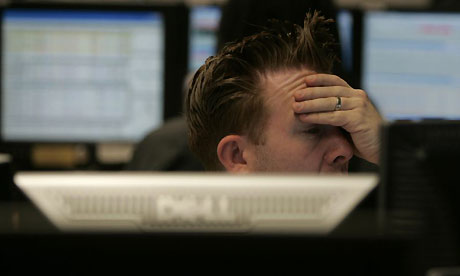• FTSE 100 has lost 31% of its value in 2008
• Russia down 72% and China off 65%P

A trader reacts to the falling FTSE 100 at CMC Markets in London. Photograph: Alastair Grant/AP
A record $14 trillion (£9.7tn) has been wiped off world share values in 2008 as many stockmarkets around the world suffered their worst 12 months on record.
Turmoil in the financial system and the worst global recession since the 1970s have sent shares reeling. Global stocks, as measured by the MSCI index, have fallen by a record 44% over the year.
In London, the FTSE 100 index lost 31.3% in 2008, its worst annual decline since it was created in 1984, and following a 3.8% gain in 2007. It edged up 0.94% to 4434.17 on the last trading day of the year, a gain of 41.49 points. Banks, at the centre of the financial storm, were among the biggest losers ranging from HBOS, Royal Bank of Scotland and Lloyds TSB to Barclays. Mining companies Kazakhmys, Xstrata and Rio Tinto also fared badly as the economy worsened.
Drugmakers AstraZeneca and GlaxoSmithKline were among the best-performing stocks on the FTSE. British Energy was another big gainer, up more than 40% in a year in which the government secured the sale of its stake in the nuclear power firm to French energy giant EDF.
David Buik at BGC Partners talked of an “annus horribilis by any standards”.
It started with the Northern Rock nationalisation, and got progressively worse. In March, US investment house Bear Stearns became the first major bank to be rescued from collapse and by the autumn scores of banks around the world had gone under – notably Lehman Brothers – or been bailed out. Lending between banks ground to a halt, triggering more government interventions, and most major economies slid into recession.
Sterling has also had its worst year against the euro since the single currency started life almost a decade ago. The pound staged a rally on the last day of the year, rising 2% to 95.44p versus the euro. But analysts say there was nothing to prevent further losses that could take the pair to parity, with UK interest rates set to fall close to zero in the new year from 2% now – far below rates in the eurozone, currently at 2.5%.
Against the dollar, the pound has lost nearly 27% over the year, the sharpest drop since the gold standard monetary system was abolished in 1971. It traded around $1.4605 today.
Oil dropped to $37 a barrel, heading for its worst year ever with a slump of more than 60%.
Last night, Wall Street took heart from Washington’s expanded bail-out of the embattled auto sector, with the Dow Jones industrial average closing up 2.2%. The Dow is off nearly 35% so far this year.
The mainland European bourses that opened for a half day drifted marginally upwards but still registered their worst yearly losses for decades. The CAC-40 in Paris notched up a decline of 43%, the worst run in its 20-year history. Germany’s Dax-30 closed down 40.4% yesterday while Italy’s MIB-30 was off 48.5% and Spain’s Ibex-35 down 47.5%.
The worst-performing stockmarket over the year was Russia’s, where the benchmark RTS index plunged by 72%. Second worst hit was China’s benchmark Shanghai composite index, which plummeted 65% – its largest-ever annual drop – after soaring more than 300% over 2006 and 2007.
“China’s economy is obviously at a turning point. There are too many uncertainties, and past huge losses have made investors increasingly cautious,” said Cheng Weiqing, an analyst at Citic Securities in Beijing.
Many investors are hoping for a better year in 2009, taking heart from the stock gains seen during December. “If there’s any optimism, it’s on the basis that stockmarkets recover in recessions,” said Justin Urquhart Stewart of Seven Investment Management. “Now we have the real recession, rather than the phoney recession. Last year we were so optimistic that we were fooling ourselves. It’s gone too far the other way.”
Buik said the outlook for the UK was mixed. “With the dole queue likely to increase to 2.5 million by the end of May 2009, and with corporate profits in the next quarter likely to fall by 15% and with the housing market continuing to retrench, the immediate outlook for equities is unappetising,” he said. “However, with many companies still paying reasonable dividends, the UK stockmarket should rally strongly in the second half of the year with the FTSE ending at 5000, as the UK attempts to dig itself out of recession.”
Across Asia, stocks suffered record falls over the year, a painful change from its once-booming markets. In Tokyo, the benchmark Nikkei closed for the year yesterday having recorded the biggest annual percentage loss in its 58-year history. Modest gains in December – the first since May – did little to mitigate a yearly loss of 42% after the world’s second-largest economy sank into recession.
In Hong Kong, also in recession, the Hang Seng index ended the year 48% lower, its worst annual drop since the global oil shock of the early 1970s. India’s main index in Mumbai plummeted by 52%.
The South African stock exchange lost 27% this year and the rand slipped almost 30%.
Julia Kollewe
Wednesday 31 December 2008 14.37 GMT
Source: The Guardian